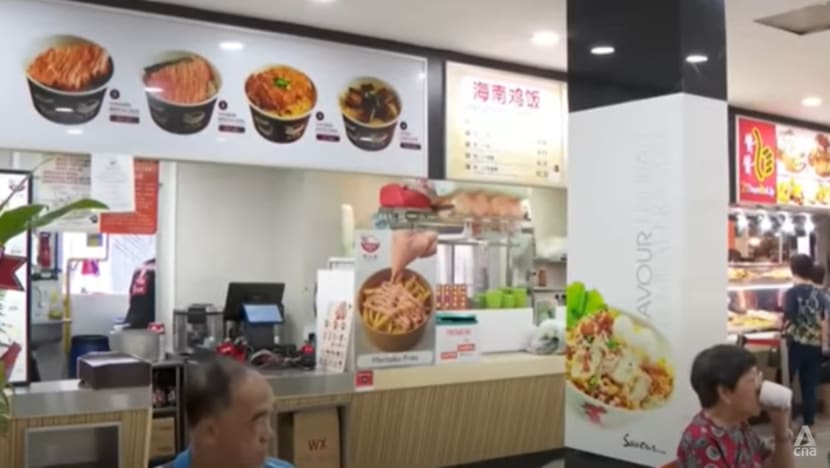Some stallholders in heartland coffee shops call it quits over high rent and costs
Some stalls have tried to cope by passing on the costs to consumers and scrimping in other areas, but overheads remain high.

An outlet of Japanese food stall chain Mentai-Ya at a coffee shop in Singapore.

This audio is generated by an AI tool.
SINGAPORE: Higher rent and rising costs are forcing some stallholders to exit coffee shops in the heartlands.
Some stalls have tried to cope by passing on the costs to consumers and scrimping in other areas, but overheads remain high.
Japanese food stall chain Mentai-Ya is one such business affected by growing expenses. Last month, it shuttered two stalls in coffee shops in Clementi and Boon Keng.
Its owner Khoo Keat Hwee said rent at the Clementi outlet, situated at a prime location near the MRT station, has gone up by about 20 to 30 per cent since he set up shop there two years ago.
He did not reveal how much rent he was paying there, but said the price can go up to S$9,000 (US$6,700) per month for spaces at good locations.
“The stalls we closed were doing fine in terms of customers but with the rent increase, it won’t be sustainable as we would have to increase the price and lose customers in the process,” he said.
Aside from rental, other costs such as employee wages, ingredients, supplies and utilities have also gone up.
Last year, the price of salmon increased by about 25 to 30 per cent, said Mr Khoo. The fish is an integral ingredient for one of the stall signature dishes – the salmon mentai don.
This forced Mr Khoo to also increase the price of his dishes by S$1. However, he has lost at least 10 per cent of his patrons since then.
“Some of my customers, their kids love to eat salmon mentai but they say ‘Can you lower down your price a bit? We don’t come (so often anymore) because it’s expensive’,” he told CNA.
“It's one of my biggest regrets (to raise prices) because a lot of people won't be able to afford it. I've been finding ways to really make things affordable for the public.”
Mr Khoo said that should business expenses continue to rise, it would become harder to maintain the six more Mentai-Ya outlets in heartland coffee shops around the island.
Two branches are situated in Sengkang and Punggol, newer estates which command much higher rent than mature neighbourhoods.
He said none of his outlets are housed within coffee shops that were sold for record prices.
“My rental is (considered) normal, but this normal is really high cost,” he said.
HIGH BUSINESS COST ENVIRONMENT
Many other stallowners share the same predicament.
Stallowners in a Facebook group for those in the industry say they also face the challenges of higher rent and costs.
However, many did not want to be interviewed, fearing that sharing their views would affect their current business or chances of getting another stall elsewhere in future.
Another stall closing due to “rising operational costs and challenging footfall” is Ah Lim Chicken Rice in Bedok Town Centre.
CNA understands that upon taking over from the previous stall holder, the new owners had to pay an additional few hundred dollars in monthly rental.
After less than one year in the business, the stall will cease operations at the end of this month.
While the owners look for a new location, the stall will shift the sale of its signature chicken rice onigiris online to social media.
WHY ARE STALL RENTALS SO HIGH?
Observers said coffee shops sold at tens of millions of dollars could have led to the high rent environment.
Three coffee shops in Yishun, Tampines and Serangoon changed hands for at least S$40 million each in recent years.
“The owners of other coffee shops may think that because these coffee shops are able to achieve such record prices, they essentially also raise the valuation,” said Mr Nicholas Mak, chief research officer at property portal Mogul.sg.
Cost pressures from increased borrowing and insurance expenditures, as well as labour for maintenance and security, could also have been passed down as higher rent for tenants.
Observers said cooling measures that the government has implemented for properties have also driven some investors out of the private residential market into the commercial property space, which includes coffee shops.
PRICES MAY COOL THIS YEAR
However, one analyst said prices might cool off this year.
“We think that (prices) are likely to be stable. The high interest rate is going to still have a bearing on investor choice, especially those who are only investing and not part of a coffee shop chain,” said Mr Lee Sze Teck, senior director of data analytics at Huttons Real Estate Group.
There are about 770 Housing and Development Board (HDB) coffee shops in Singapore and 400 privately-owned ones.
In 2022, it was reported that 70 per cent of them were sold at below S$10 million, with an average of 15 transactions yearly.













.jpg?itok=W97Kj2QL)






